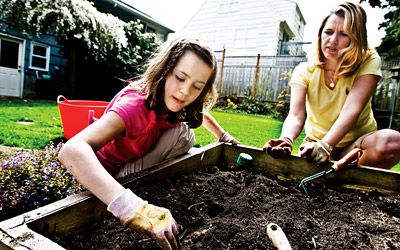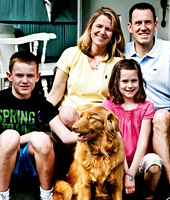Contentment Redefined
One Family's Quest to Live Differently.

Allie and Jennifer plant green beans in a raised vegetable bed. “We’re growing food for ourselves,” says Jennifer, “but we’ve planted enough to share with neighbors and the Ballard Food Bank.”
Photos by Mike Siegel
By Jennifer Cooley Perrow ’90
Photos by Mike Siegel
Economy sheds half million more jobs. Home prices down $100,000. Budget may leave food banks empty. Even elderly are facing eviction. These are a few of the headlines that have greeted me in recent months as I’ve sat down with my morning coffee and newspaper. Bad news about the economy has been everywhere.
I don't need the news to tell me that times are tough, however — the economy is taking its toll on plenty of people I care about.
One family we know packed up and moved out of state after a job layoff and months of searching unsuccessfully for employment. Almost all of our self-employed friends have seen their incomes plummet. And other people we know, from those in the high-tech industry to those in the nonprofit sector, are thankful for each paycheck, aware that cutbacks are coming.
Although my husband and I are still employed, we have been impacted by this ever-changing economy in a variety of ways. We also know that we are not immune to future layoffs. And so we are rethinking old habits, and pushing ourselves to think creatively about new ways to save money and fresh ways to give more to those who need it.
I’ll admit, though: Despite our best efforts to live differently,
I’m overwhelmed by the complexity of the choices in front of us.
If there’s extra money in the grocery budget at the end of the month, do we deposit it in the bank or drop it in the offering plate? Is it
better to save money by shopping at giant discount stores, or spend more money shopping at locally owned businesses? Is it OK to buy myself a latte, or a new pair of shoes, or are those luxury items? And if we talk about economic hardship at the dinner table, will it teach our school-aged kids to be grateful, or fearful?

The Perrows: Jennifer and Dan with their children, Jake and Allie, and their dog, Daisy, on the front porch of their home in North Seattle. |
It’s almost enough to make me throw my hands up and decide that perhaps one family’s choices don’t make much of a difference anyway. But I know that isn’t true. As Christians, we are called to be good stewards of all that God has given us — making careful choices with our money and maximizing our resources (time, money, talents) in ways that honor God and reflect his amazing generosity toward us. So, although our family is far from perfect in our spending habits, we are indeed doing things differently because of the economic crunch.
We’ve begun trimming expenses by searching for new ways to meet existing needs. When gas prices hit an all-time high last summer, we challenged ourselves to see how long we could go between tanks of gas. Instead of driving to and from swim practice each day, we rode our bikes. We planned errands and outings strategically — no more hopping in the car every time we needed something. We got in the pleasant habit of borrowing books, DVDs, and the usual “cup of sugar” from neighbors. We cut our gasoline consumption in half, simplified our lives, and had a great time doing it.
We’ve also tackled the clothing budget by finding alternative ways to acquire things we need. My friends and I swap clothes when one of us needs a special-occasion dress, vacation attire, or “something new” to wear. Our family also heads to the thrift store before heading to the mall. Best recent bargain: three pairs of like-new, brand-name, perfectly sized basketball shorts (just $3.99 each) for my rapidly growing son. We also trade outgrown children’s clothes, shoes, and sporting equipment with other families. It feels good to know we are saving money and making environmentally sound choices by consuming less and reusing more.
We’re also aiming to give more. Charitable giving is down everywhere, and churches, educational institutions, and other nonprofits need our support more than ever. As we find new ways to save money, we want to increase the amount we give away. We are inspired here by friends who are giving more even while their own families are living on less. One family upped their church pledge, despite the possibility of a job cutback. Another family decided not to send Christmas cards last year, instead donating the money they would have spent to a world relief agency. Other friends gave charitable gift cards for Christmas gifts, rather than buying more “stuff” nobody needed.
Of course there are many creative, thoughtful ways to give — not all of which involve writing large checks. One family we know hires babysitters frequently; whenever possible, they hire a teenager from a family who is struggling financially so they can pay her more than the going rate. Another family we know has the gift of hospitality: They invite friends in need over for dinner — then pack up the leftovers and send them home with their guests. Volunteering at a food bank, adding an extra family to the carpool, and dividing up (and giving away) multipack items from warehouse stores are other ways people around us are making a difference.
In addition to cutting our spending and looking for new ways to give, we’re also working to cultivate attitudes of contentment, gratitude, and hope. While we don’t have everything we want,
we have far more than we need. We aim to live in hope, not fear, trusting that God will continue to provide for us — even if that provision looks different in the future.
Now when we pray at mealtimes, we thank God for the food — and for our home, health, family, friends, church, and neighbors. We want to teach our children (and ourselves) to be joyfully satisfied with what God has given us. Like the Apostle Paul, I want to be able to say that “I have learned to be content whatever the circumstances. I know what it is to be in need, and I know what it is to have plenty. I have learned the secret of being content in any and every situation, whether well fed or hungry, whether living in plenty or in want. I can do all things through Him who gives me strength.” (Philippians 4:10-14)
Already our children are thinking differently about what they have and what they need. My daughter wants to give more of her allowance to a world relief agency, and my son recently donated a surprisingly generous amount of his dog-walking money to help purchase a cow for an Ethiopian family. The photo of our sponsored Ethiopian child — with the new cow — is posted on our refrigerator, and we smile when we look at it. I’m delighted to see my children live out their faith, experiencing the hope and joy that come with giving generously.
And so, in spite of the bad news that screams at me from the headlines each morning, it seems there is also good news to be found. If this recession prompts us to cut back on unnecessary expenses, find new ways to give, and consume less of the earth’s resources, that’s good news. If the economic slump causes us to permanently replace some of our selfish, consumer-driven habits with sensible, sustainable ways of living, then that’s good news too. And if, like Paul, we can grasp the secret of true joy and contentment — well, then that truly is the best news of all.
Read more "Good News in the Bad News"
Return to top
Back to Features Home
|